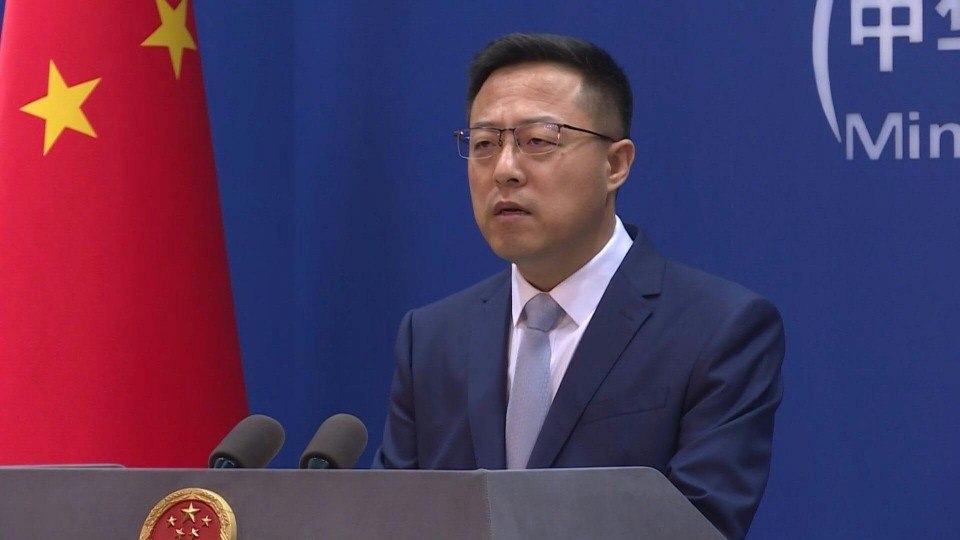TAIPEI, Taiwan (AFP) — China on Thursday voiced opposition to Taiwan joining a major trans-Pacific trade deal as it flew 24 planes including two nuclear-capable bombers into the self-ruled island’s air defence zone, the biggest incursion in weeks, Taiwanese officials said.
Last week Beijing submitted its own application to become a member of the Comprehensive and Progressive Agreement for Trans-Pacific Partnership (CPTPP).
Taiwan has lobbied for years to join and announced on Thursday that it had officially applied to be part of the CCTPP, which was signed by 11 Asia-Pacific countries in 2018 and is the region’s biggest free-trade pact, accounting for around 13.5 percent of the global economy.
“Taiwan can’t be left out in the world and has to integrate into the regional economy,” cabinet spokesman Lo Ping-cheng told reporters.
But China, which claims self-ruled democratic Taiwan as its own territory, insisted Taipei should not be allowed in.
On the same day Taiwanese officials said 24 Chinese planes — including 18 fighter jets and two nuclear-capable bombers — crossed into the island’s air defence identification zone.
The zone is an area outside of a country or territory’s airspace but where foreign aircraft are still monitored and controlled for national security reasons. It is self-declared and technically remains international airspace.
“We firmly oppose any country having official exchanges with Taiwan and firmly oppose the Taiwan region’s accession to any official treaties or organisations,” Chinese foreign ministry spokesman Zhao Lijian told reporters.

China’s authoritarian leaders have vowed to one day seize Taiwan, by force if necessary.
They have ramped up economic, military and diplomatic pressure on the island since the 2016 election of President Tsai Ing-wen who views Taiwan as a sovereign nation.
China often sends military aircraft into Taiwan’s air defence zone to display displeasure but Thursday’s incursion was the biggest since June 15.
– Trade tussles –
Negotiations for the sweeping trade deal were initially led by the United States as a way to increase its influence in the Asia-Pacific region.
It was originally designed to keep China, which has its own regional trade deal, locked out.
But former US president Donald Trump, who disdained multilateral agreements, pulled out of the deal in 2017.
The CPTPP is the successor to those negotiations and currently includes Australia, Brunei, Canada, Chile, Japan, Malaysia, Mexico, Peru, New Zealand, Singapore and Vietnam.
Those hoping to join must have the unanimous support of all the pact’s member countries, something both China and Taiwan may struggle to obtain.
China’s application comes at a time when Beijing is feuding with a host of Western nations, especially Australia, which it has placed trade restrictions on.
Australia this week said China must end a freeze on contact with senior Australian politicians if it hopes to sign up.
Meanwhile smaller countries within the CPTPP are unlikely to want to risk incurring Beijing’s wrath by agreeing to let Taiwan join.
But China’s growing threats towards Taiwan have generated international sympathy for the island among Western powers.
Rupert Hammond-Chambers, chair of the US-Taiwan Business Council, said “China’s submission should have no bearing on Taiwan’s application”.
He added that Taipei’s application “should be considered by the CPTPP members on its own economic merits and free of all Chinese political and military intimidation or coercion”.
The application has already been received favourably by Tokyo.
“Japan welcomes Taiwan’s application to join the Trans-Pacific Partnership,” Japanese foreign minister Toshimitsu Motegi told reporters in New York.
John Deng, Taipei’s lead trade negotiator, said he expected Chinese opposition but portrayed Taiwan as a more reliable free-trade partner.
“We have the foundation of democracy and the rule of law so all our regulations are transparent and we respect private properties,” he said.
© Agence France-Presse







